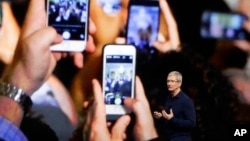Many people have long believed Apple intentionally slows down performance of iPhones in an effort to get users to buy new ones.
For the first time, Apple has admitted to slowing some iPhones down. But the company explained it only took the action last year to prevent battery-related shutdowns.
Apple’s action – and the company’s decision to keep it secret - led to widespread criticism from industry analysts and iPhone owners.
Owners of iPhones in several states are suing Apple. They accuse Apple of violating fraud laws by purposely limiting performance without informing iPhone owners that the problems might have been fixed by replacing the device battery. This, they argue, forced them to spend more money to buy new iPhones.
The issue of iPhone slowdowns in certain phones was recently noted in an online post by the founder of software maker Primate Labs. In his post, John Poole cited test results suggesting repeated reductions in iPhone performance over time.
The tests included the iPhone 6s and iPhone 7, with several different operating system versions. Results of the tests blamed aging batteries for causing the reduced device performance.
Poole said his company’s software that measures processor performance found that some users who replaced their iPhone batteries reported much improved results.
But he was not convinced that old batteries were the whole problem. He came up with a theory. He believed Apple must have made changes to the iOS software to limit iPhone performance when battery capacity reached a certain point.
A few days later, Apple released a statement admitting it made the software change. It said the action was needed to prevent certain devices from suddenly shutting down.
The problem, Apple said, was connected to lithium-ion batteries inside the iPhone. The batteries can fail in certain conditions – such as hot or cold - or as they age over time. This can sometimes cause older iPhones to shut down, Apple said.
Apple said it released the new feature last year for the iPhone 6, iPhone 6s and iPhone SE. It later added the iPhone 7 with iOS 11.2 and plans “to add support for other products” in the future.
“Our goal is to deliver the best experience for customers, which includes overall performance and prolonging the life of their devices,” the Apple statement said.
But many iPhone owners were not very forgiving of Apple’s decision, as evidenced on Twitter:
In his reporting of the latest developments, Wired magazine’s Jordan McMahon pointed out several ways Apple could have handled the situation before deciding to secretly slow the phones.
He suggested Apple could have informed iPhone owners about the lithium-ion issues beforehand and given them a chance to get the batteries replaced. Or the company could have even launched a program to sell owners battery replacement kits.
Apple has always strongly resisted having owners buy and replace their own iPhone batteries. There are many companies that sell do-it-yourself kits or will do the service for you.
Apple has its own battery replacement service – either in Apple stores or through the mail - and charges $79 for any iPhone model that is no longer under warranty.
But based on the huge negative reaction to Apple’s change, it seems many people are not aware of that possibility. They have complained about being forced to either buy a new, expensive iPhone, or switch brands to fix the problem.
Several economic analysts have lowered predictions for 2018 shipments of the iPhone X as some news reports also suggested there will be much lower demand. Taiwan’s Economic Daily reported Monday that Apple could cut its sales targets for the iPhone X in the first quarter from 50 million to 30 million.
I’m Bryan Lynn.
Bryan Lynn wrote this story for VOA Learning English, based on reports from Reuters, Agence France-Presse and other sources. Hai Do was the editor.
We want to hear from you. Write to us in the Comments section, and visit our Facebook page.
_____________________________________________________________
Words in This Story
fraud – n. the crime of using dishonest methods to take something valuable from another person
convince – v. make someone believe something is true
capacity – n. the largest amount that a machine or system can handle
prolong – v. make something last longer
kit – n. set of parts a person can use to put something together themselves
warranty – n. a written promise by a company to repair its products if it has a fault
complain – v. to say or write that you are unhappy or not satisfied with something





